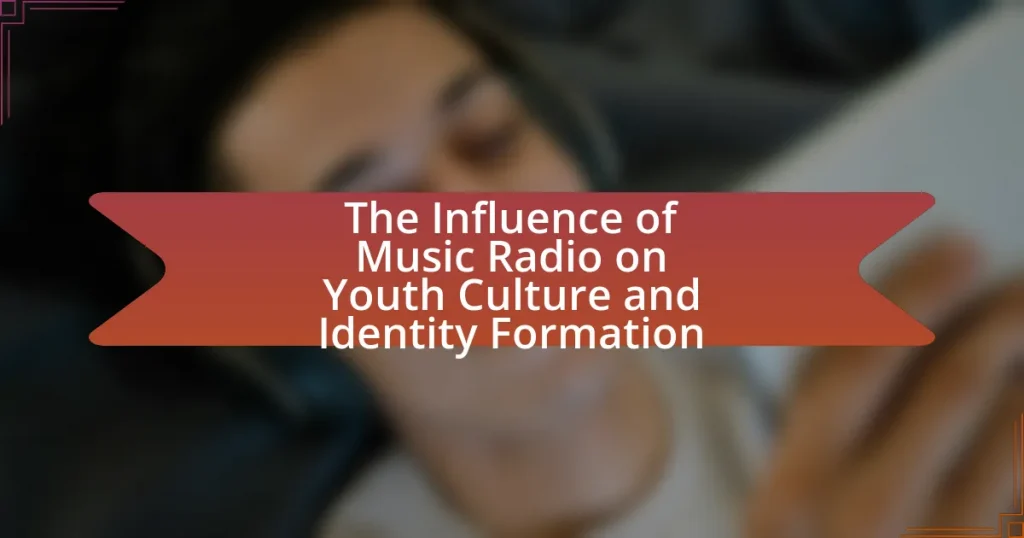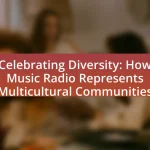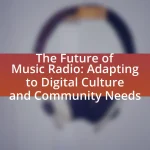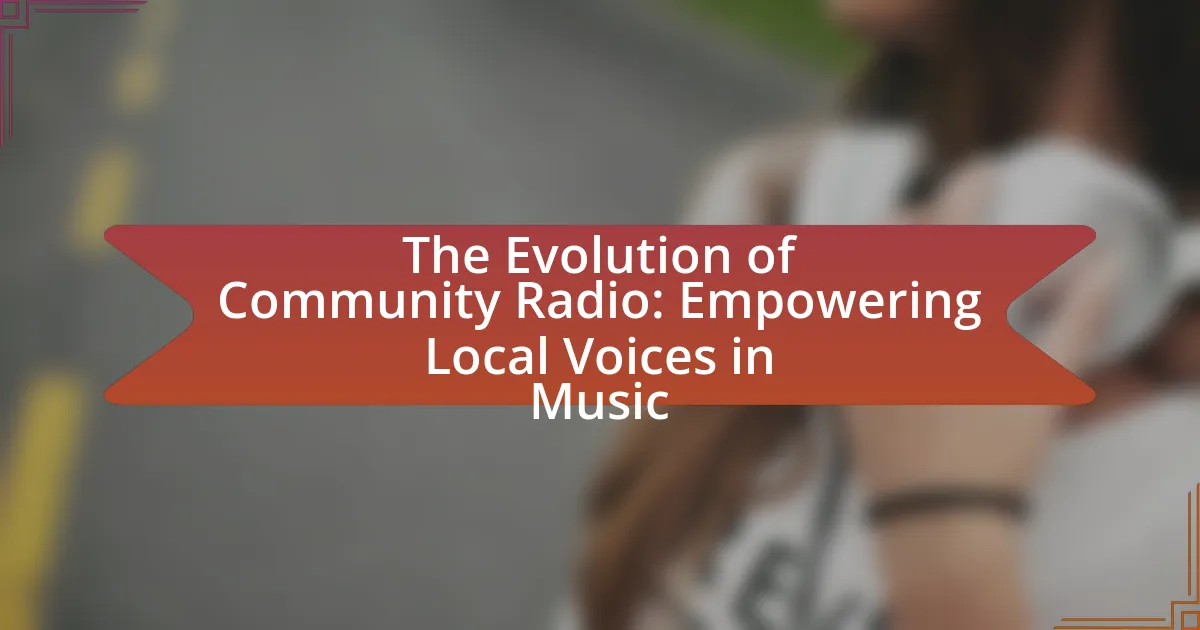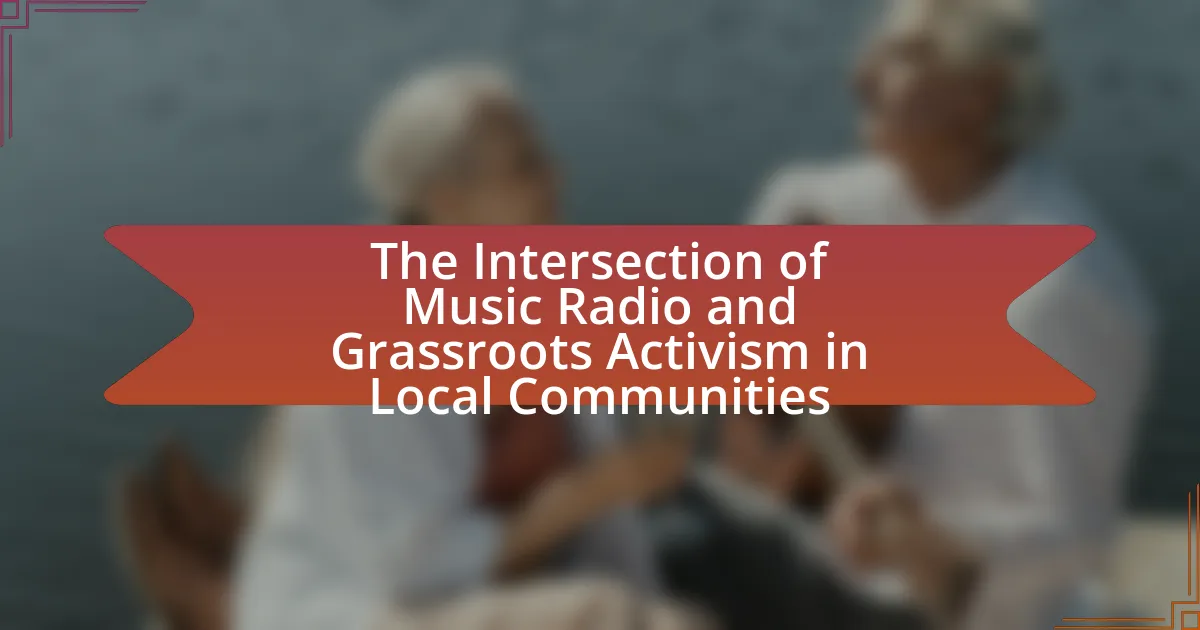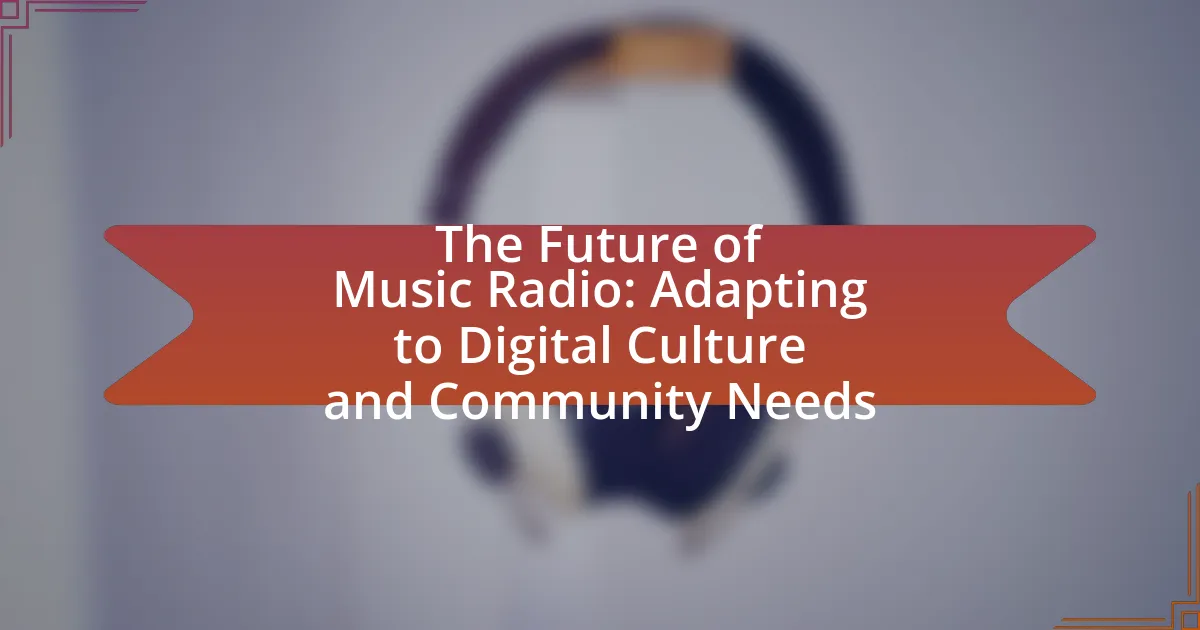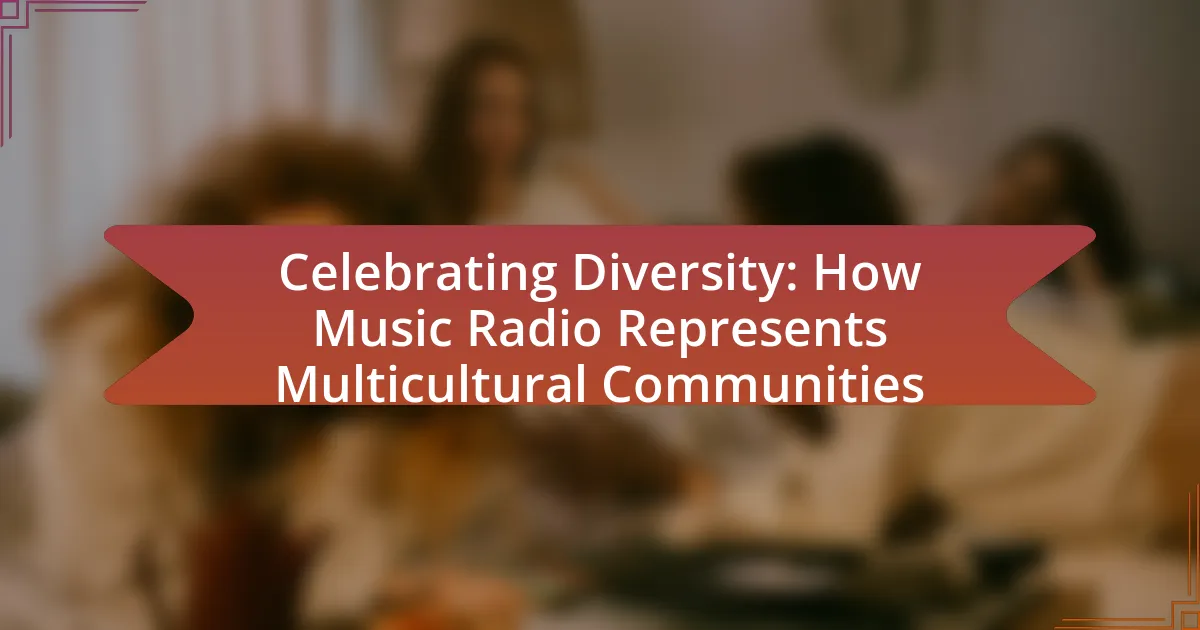The article examines the significant influence of music radio on youth culture and identity formation. It highlights how music radio shapes musical preferences, social interactions, and cultural values among young listeners, fostering a sense of belonging and community. Key topics include the role of music in daily life, the impact of music genres on identity, and the psychological effects of music radio on youth. Additionally, the article discusses how music radio interacts with technology and social media, promoting inclusivity and supporting youth mental health. Overall, it underscores the importance of music radio as a platform for cultural discourse and identity development among adolescents.
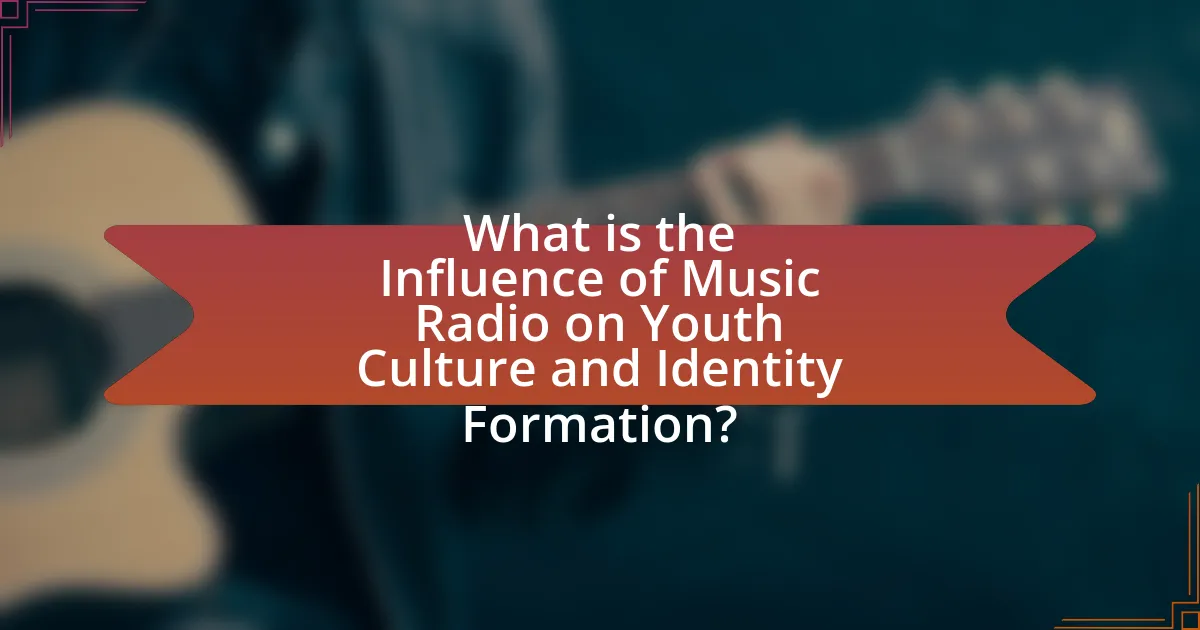
What is the Influence of Music Radio on Youth Culture and Identity Formation?
Music radio significantly influences youth culture and identity formation by shaping musical preferences, social interactions, and cultural values. Through curated playlists and targeted programming, music radio exposes young listeners to diverse genres and artists, which can lead to the development of personal tastes and group identities. For instance, studies have shown that music preferences often correlate with social identity, where youth align themselves with specific genres that reflect their values and experiences. Additionally, music radio serves as a platform for cultural discourse, allowing youth to engage with contemporary issues and trends, thereby reinforcing their sense of belonging within peer groups. This influence is evident in the way music radio fosters community through shared listening experiences and promotes cultural movements, such as hip-hop or punk, that resonate with youth aspirations and challenges.
How does music radio shape youth culture?
Music radio shapes youth culture by providing a platform for the dissemination of musical genres, trends, and cultural narratives that resonate with young audiences. This medium influences identity formation by exposing youth to diverse musical styles and cultural expressions, fostering a sense of belonging and community. For instance, studies have shown that radio playlists often reflect and promote emerging trends, which can significantly impact the preferences and social behaviors of young listeners. Additionally, music radio serves as a space for discussions around social issues, further shaping the values and perspectives of youth.
What role does music play in the daily lives of young people?
Music plays a significant role in the daily lives of young people by serving as a primary means of self-expression and social connection. Young individuals often use music to articulate their emotions, establish their identities, and connect with peers, which is supported by research indicating that 90% of teenagers listen to music daily, influencing their mood and social interactions. Furthermore, music acts as a cultural touchstone, shaping trends and fostering a sense of belonging within various communities, as evidenced by the popularity of music genres that resonate with specific youth subcultures.
How do music genres influence youth identity?
Music genres significantly influence youth identity by shaping their social interactions, self-perception, and cultural affiliations. For instance, genres like hip-hop often promote themes of empowerment and resistance, which resonate with youth seeking to express their individuality and challenge societal norms. Research indicates that adolescents who identify with specific music genres often adopt corresponding lifestyles and values, reinforcing their sense of belonging within peer groups. A study published in the Journal of Youth and Adolescence found that music preferences are closely linked to identity formation, with youth using music as a tool for self-expression and social connection. This demonstrates that music genres play a crucial role in the development of youth identity by providing a framework for understanding themselves and their place in society.
Why is music radio significant in identity formation?
Music radio is significant in identity formation because it serves as a primary medium through which individuals, particularly youth, connect with cultural narratives and social groups. This connection is facilitated by the diverse range of music genres and artists featured on radio, allowing listeners to explore and express their personal identities. Research indicates that music preferences often correlate with social identity, as individuals use music to align themselves with specific communities or subcultures. For instance, a study published in the Journal of Youth Studies found that adolescents who engage with music radio are more likely to develop a sense of belonging and self-concept tied to the music they listen to, reinforcing the idea that music radio plays a crucial role in shaping identity during formative years.
What psychological effects does music radio have on youth?
Music radio significantly influences the psychological development of youth by shaping their identity, emotions, and social connections. Research indicates that exposure to specific music genres on radio can enhance mood, foster a sense of belonging, and influence behavioral patterns among adolescents. For instance, a study published in the Journal of Youth and Adolescence found that teenagers who frequently listen to music radio report higher levels of emotional expression and social engagement, as music serves as a medium for self-exploration and peer bonding. Additionally, the lyrics and themes prevalent in popular music can impact youth attitudes and beliefs, reinforcing cultural norms and values. This demonstrates that music radio plays a crucial role in the psychological landscape of young individuals, affecting their emotional well-being and social interactions.
How does music radio contribute to social belonging among youth?
Music radio contributes to social belonging among youth by providing a shared cultural experience that fosters connection and community. Through the broadcasting of popular music, youth can identify with specific genres, artists, and songs that resonate with their personal experiences and emotions. This shared musical landscape creates a sense of belonging as young listeners engage in discussions about their favorite tracks, attend concerts, and participate in social media conversations centered around music. Research indicates that music serves as a powerful tool for identity formation, with youth often using musical preferences to express their individuality while simultaneously seeking acceptance within peer groups. For example, a study published in the Journal of Youth Studies found that music preferences significantly influence social interactions and group affiliations among adolescents, reinforcing the idea that music radio plays a crucial role in shaping social networks and fostering a sense of belonging.
What are the key elements of music radio’s influence on youth?
Music radio significantly influences youth through exposure to diverse musical genres, shaping cultural identity, and fostering social connections. The variety of music available on radio allows young listeners to explore different cultures and styles, which can enhance their understanding of global perspectives. Additionally, music radio often serves as a platform for emerging artists, enabling youth to discover new sounds and trends that resonate with their personal experiences. Research indicates that music plays a crucial role in identity formation during adolescence, as it helps individuals express themselves and connect with peers who share similar tastes. Furthermore, the communal experience of listening to music on the radio can strengthen social bonds among youth, creating a shared cultural experience that fosters a sense of belonging.
How do music radio programs engage young audiences?
Music radio programs engage young audiences by curating playlists that reflect current trends and popular genres, which resonate with their musical preferences. These programs often feature interactive segments, such as listener requests and social media integration, allowing young listeners to participate actively. Research indicates that 70% of young adults listen to music radio for its ability to introduce them to new artists and songs, fostering a sense of community and shared experience among peers. Additionally, music radio programs frequently host interviews with artists and discussions about cultural issues relevant to youth, further enhancing their connection to the content.
What types of content are most appealing to youth on music radio?
Youth are most attracted to contemporary music, artist interviews, and interactive content on music radio. Contemporary music, particularly genres like pop, hip-hop, and electronic dance music, resonates with young listeners, as these genres often reflect their experiences and cultural trends. Artist interviews provide insights into the lives and thoughts of their favorite musicians, fostering a connection that enhances listener engagement. Additionally, interactive content such as call-ins, social media integration, and contests encourages participation, making the listening experience more dynamic and relatable. Research indicates that 70% of youth listeners prefer stations that offer a mix of music and engaging content, highlighting the importance of these elements in attracting a younger audience.
How do hosts and DJs impact youth perceptions and identities?
Hosts and DJs significantly shape youth perceptions and identities by curating music and content that resonate with their audience’s values and experiences. Through their selection of songs, commentary, and engagement with listeners, they create a sense of community and belonging among young people. For instance, research by the Pew Research Center indicates that 62% of teens feel that music helps them express their identity, highlighting the role of DJs in facilitating this expression. Additionally, hosts often address social issues and trends, influencing youth perspectives on topics such as race, gender, and politics, thereby impacting their identity formation. This influence is further reinforced by the interactive nature of radio, where youth can engage directly with hosts, fostering a participatory culture that shapes their views and self-concept.
What are the cultural implications of music radio for youth?
Music radio significantly influences youth culture by shaping identity, social norms, and community belonging. Through exposure to diverse musical genres and artists, youth develop personal tastes that reflect their cultural backgrounds and social environments. For instance, studies show that music radio serves as a platform for cultural exchange, allowing youth to connect with global trends and local movements, thereby fostering a sense of identity and belonging. Additionally, music radio often addresses social issues, influencing youth perspectives on topics such as race, gender, and politics, which can lead to increased awareness and activism. This impact is evident in the way youth engage with music as a form of expression and a means to navigate their social realities.
How does music radio reflect and shape cultural trends among youth?
Music radio reflects and shapes cultural trends among youth by serving as a platform for popular music that resonates with their experiences and values. Through the selection of songs, radio stations curate content that mirrors the interests and social issues relevant to young audiences, such as identity, relationships, and activism. For instance, studies show that youth gravitate towards genres like hip-hop and pop, which often address themes of empowerment and social justice, influencing their cultural identity and social behaviors. Additionally, music radio fosters community and connection among listeners, as shared musical experiences can lead to collective cultural movements, evidenced by the rise of youth-led social movements that often utilize music as a rallying cry.
What is the relationship between music radio and youth activism?
Music radio plays a significant role in youth activism by providing a platform for social and political messages that resonate with young audiences. Through music, radio stations often amplify the voices of marginalized groups and promote awareness of social issues, encouraging youth to engage in activism. For example, during the civil rights movement, radio broadcasts featured songs that inspired activism and solidarity among young people, such as “A Change is Gonna Come” by Sam Cooke. This historical context illustrates how music radio has historically influenced youth movements, fostering a sense of community and urgency around social change.
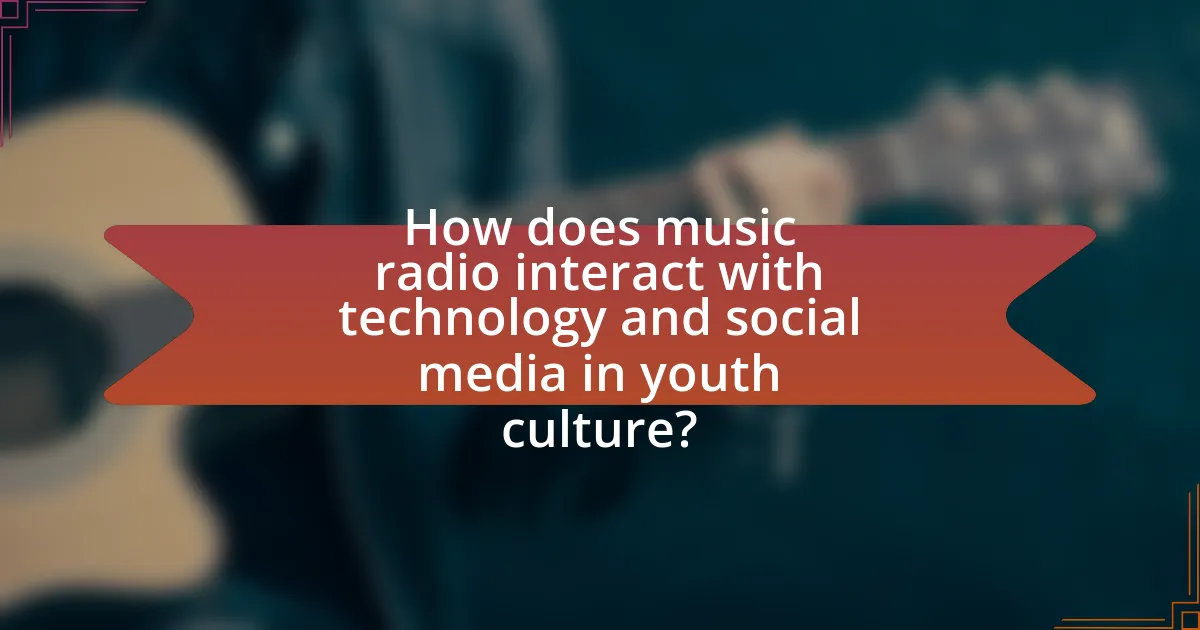
How does music radio interact with technology and social media in youth culture?
Music radio interacts with technology and social media in youth culture by serving as a platform for music discovery and community engagement. This interaction is facilitated through streaming services and social media platforms where radio stations share playlists, promote new artists, and engage listeners in real-time discussions. For instance, a study by the Pew Research Center found that 63% of teens use social media to discover new music, highlighting the integral role of these platforms in shaping musical preferences. Additionally, radio stations often utilize social media to create interactive experiences, such as live tweeting during broadcasts or hosting listener polls, which fosters a sense of community among young audiences. This synergy between music radio, technology, and social media not only enhances music accessibility but also influences identity formation by allowing youth to connect with like-minded individuals and express their musical tastes publicly.
What role does technology play in the consumption of music radio by youth?
Technology significantly enhances the consumption of music radio by youth by providing access to diverse platforms and content. With the advent of streaming services, mobile applications, and social media, young listeners can easily discover, share, and engage with music radio stations from around the world. According to a 2021 report by Nielsen, 63% of young adults aged 18-34 listen to online radio, highlighting the shift from traditional FM/AM broadcasting to digital formats. This accessibility allows youth to curate their listening experiences, fostering a sense of identity and community through shared musical preferences.
How do streaming services complement traditional music radio for young listeners?
Streaming services complement traditional music radio for young listeners by providing personalized music experiences that enhance discovery and engagement. While traditional radio offers curated playlists and local content, streaming platforms like Spotify and Apple Music allow users to create custom playlists, access vast libraries, and receive algorithm-driven recommendations based on listening habits. This combination fosters a more interactive and tailored listening experience, appealing to the preferences of younger audiences who value control over their music choices. According to a 2021 report by the Pew Research Center, 72% of young adults aged 18-29 use streaming services, highlighting their significance in shaping music consumption alongside traditional radio.
What impact does social media have on music radio’s reach among youth?
Social media significantly enhances music radio’s reach among youth by providing platforms for music discovery and engagement. Youth increasingly rely on social media channels like Instagram, TikTok, and Twitter to discover new music and artists, which in turn drives them to listen to music radio stations that feature trending songs. According to a 2021 survey by Nielsen, 63% of young listeners reported that social media influences their music choices, indicating a direct correlation between social media activity and music radio listenership. This trend illustrates how social media acts as a catalyst for music radio’s relevance and accessibility among younger audiences.
How can music radio be leveraged to foster positive youth identity?
Music radio can be leveraged to foster positive youth identity by curating diverse playlists that reflect various cultures, experiences, and social issues relevant to young listeners. This approach allows youth to see themselves represented in the music they consume, promoting a sense of belonging and validation. Research indicates that exposure to diverse musical genres and messages can enhance self-esteem and encourage positive social interactions among youth. For instance, a study by the University of Southern California found that youth who engage with music that resonates with their identity are more likely to develop a strong sense of self and community. By featuring artists from different backgrounds and highlighting themes of empowerment and resilience, music radio can play a crucial role in shaping positive youth identity.
What strategies can music radio adopt to promote inclusivity and diversity?
Music radio can adopt several strategies to promote inclusivity and diversity, including diversifying playlists, featuring underrepresented artists, and engaging with diverse communities. By incorporating a wide range of musical genres and artists from various cultural backgrounds, music radio can ensure that listeners are exposed to different perspectives and experiences. Research indicates that diverse representation in media can positively influence youth identity formation and cultural understanding. For instance, a study by the Pew Research Center found that exposure to diverse media content fosters empathy and reduces prejudice among young audiences. Additionally, hosting community events and discussions can create a platform for marginalized voices, further enhancing inclusivity.
How can music radio support youth mental health and well-being?
Music radio can support youth mental health and well-being by providing a platform for emotional expression and connection. Through curated playlists and relatable content, music radio fosters a sense of community among young listeners, which can alleviate feelings of isolation. Research indicates that music can significantly influence mood and emotional states; for instance, a study published in the Journal of Youth and Adolescence found that engaging with music can enhance emotional regulation and reduce symptoms of anxiety and depression among adolescents. Additionally, music radio often features discussions on mental health topics, offering resources and promoting awareness, which can empower youth to seek help and support.
